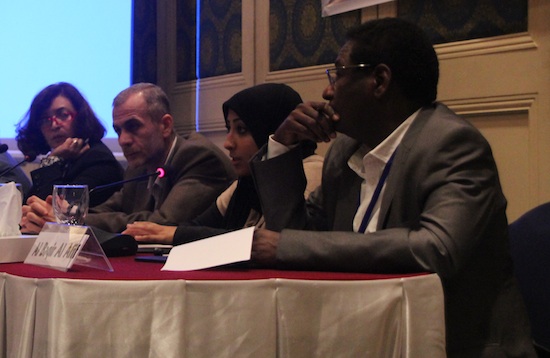Voices on Justice: Bahrain, Syria, Sudan, and Yemen
The last session of the conference gave the floor to human rights activists from various countries in the Middle East and North Africa region to describe the severity of the human rights violations in their countries, and voice their demands to the international community and the Arabic League.
Activists from Syria, Yemen, Bahrain, and Sudan reported on their countries’ situations and needs.
Syrian political and human rights activist Hazem Nahar briefed the participants on the situation in his country and expressed concern over escalating human rights violations.

According to Nahar, the major problem in Syria is that the people are trying to deal with two consecutive Assad terms: Hafez the father and Bashar the son. He added that the issue of transitional justice was first suggested in 2000 when Bashar came to power. “The people could have disregarded the inheriting the power factor had the HR violations issues been resolved,” he said, adding that there had been no response to demands of reforms since 2000.
Nahar noted that 15 thousand persons are missing in Syria from the 1980s. “This involves and frustrates many people in Syria in addition to the destruction of the political infrastructure,” he said. He also mentioned that 30-40 thousand people were killed when Hama was attacked at the beginning of 1980. “Then there was an accumulation of numerous violations since the ruling party did not carry out any reforms.”
Nahar said that since March 2011 the level of human rights violations is too high and ongoing until the moment noting that no precise numbers are available. He cited 3500 martyrs for the Syrian revolution, 15 thousand wounded and 30 thousand arrested until the moment with various cities under siege.
“All the violations are protected by the laws,” said. “There is no chance for judiciary independence.”
Nahar said Syria can benefit from certain points from points from other transitional justice processes including the important role of victims, the role of civil society and NGOs, and dialogue between the elite and political components of the country.
He mentioned the key to change in Syria has become a decision of the United Nations Security Council, particularly Russia and China “although we do not want that and we are against foreign interference.”
He also said that international human rights bodies can help though pressuring governments, strengthening the awareness on transitional justice, creating an accurate record of the HR violations in Syria, and help reform the judiciary and civil society in Syria.
“We do not know yet where matters might go in Syria,” he concluded.
Head of the Yemen Center for Transitional Justice Yassin al Kabati included in his intervention a narration of his country’s long history of political assassinations that were not investigated and massacres.
Kabati explained how Yemeni legislation includes articles that hinder the judicial process in addition to the lack of correct investigations and trials. Legislative reform is needed, he said.
He criticized the ministry of human rights for having never been active, citing how the nationals are imprisoned in the state’s institutions buildings.
Kabati briefed the audience on the violations of human rights such as transforming the hospitals into military sites and the bombing of the airport. Yemen has no fuel, no gas, no electricity, garbage is in the streets, he said.
“We are struggling against this dictator.” He then criticized the UN for issuing decisions “against the human rights” and the Arab union for “not caring about the people.”
Head of the international relations department of the Bahrain Center for Human Rights Studies said that people outside Bahrain do not know that the demonstrations and violations are ongoing in the country due to the government’s control of information. Trials are being sped up and each verdict is worse than the other, she said.
Bahrain needs five things: complete withdrawal of Gulf Cooperation Council forces from the country, accountability, reinstatement of employees, stopping the use of excessive force against demonstrators, and the release of political prisoners without royal pardon because they deserve freedom and this is not a royal decision.
She also voiced concern that the government is pushing the country toward a sectarian strife where Sunnis and Shiites fight each other rather than demand freedom, adding that this will have a spill out to the region.
Director of Alkhatem Adlan Center for Enlightenment and Human Development in Sudan stressed on the relation between the ruler and the people saying it is at best one of “colonization” and at worse one of “slavery.” He added that the ruler protects himself through complicated legislations and terrifying the people.
The state feels powerful by weakening the people, political parties and civil society.
“We are dealing with a long process and we should integrate the principles of transitional justice in building a new paradigm, culture and school of thought.”
He also raised questions on the alternatives in the countries where the revolution succeeded and whether they will be better.
Moderator of the session Dina al Kahwaga, wrapped up the session with the common points from the interventions: ongoing violence and HR violations, the difficulty of accurate documentation in the three, the UN and Arab Union weak role, and the of sectarian factor to incite people against each other rather than the regime.
